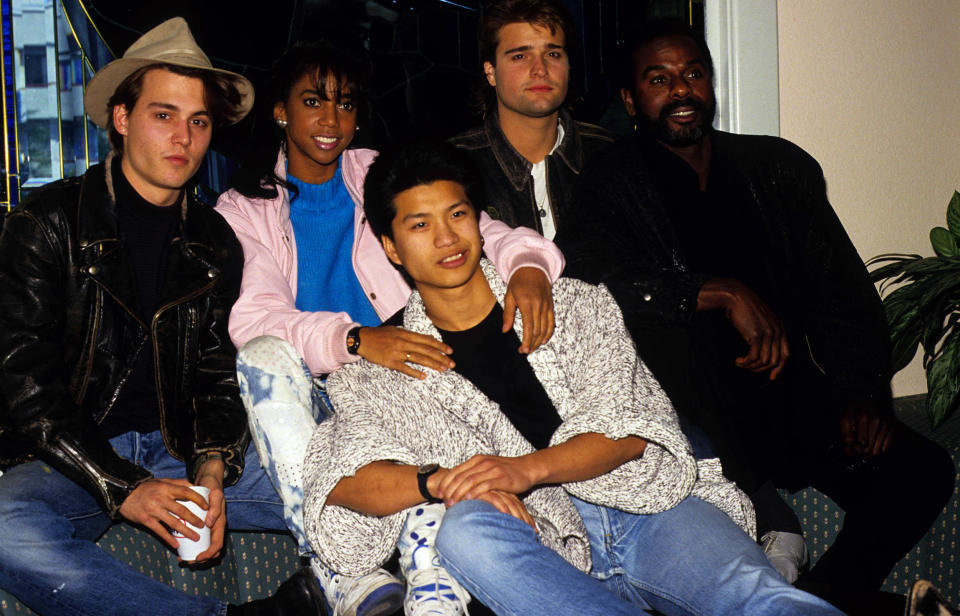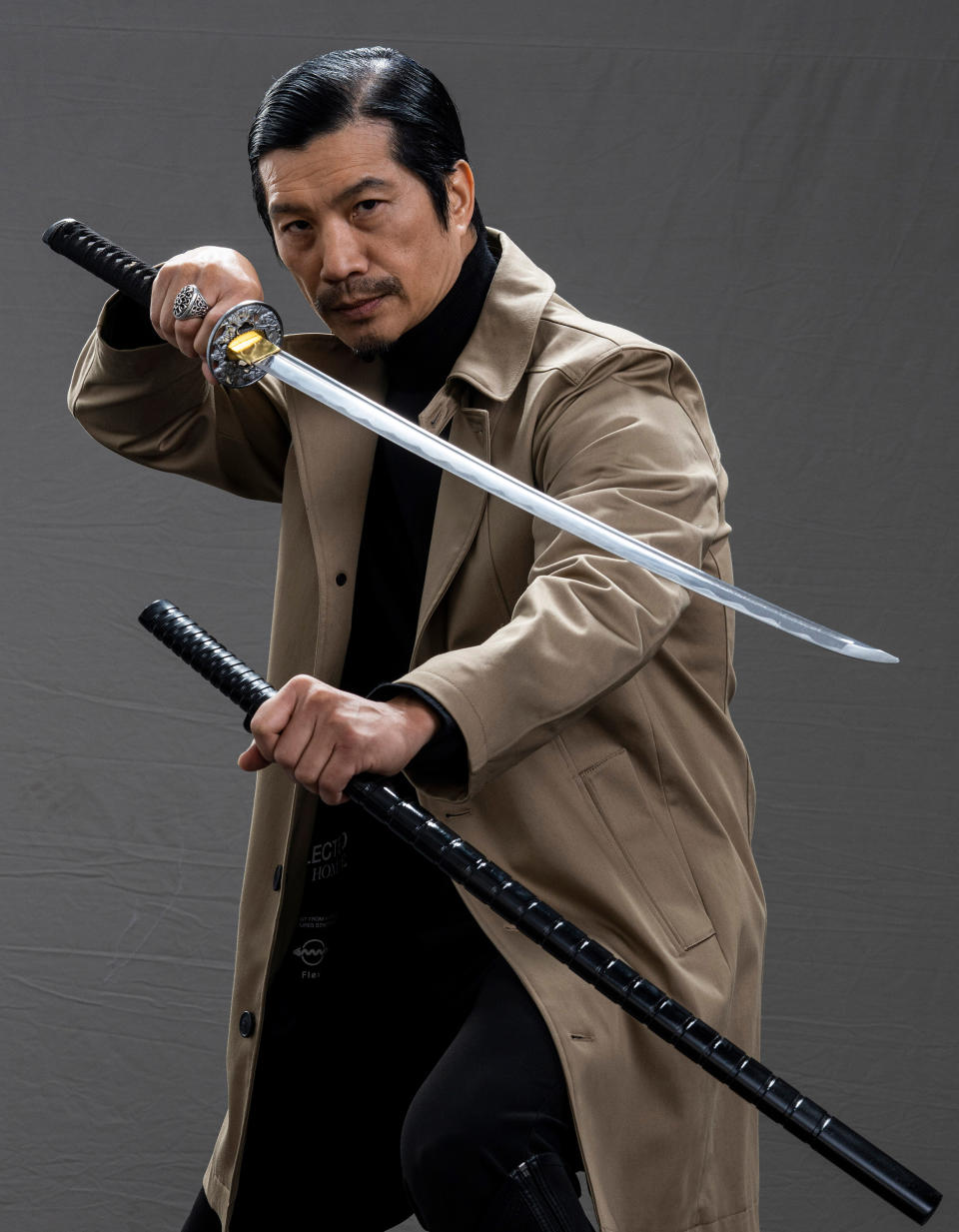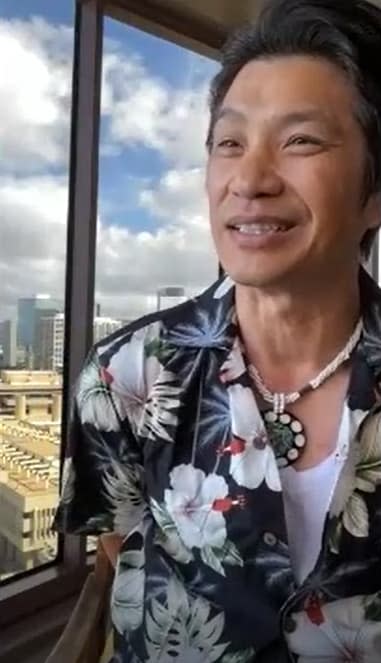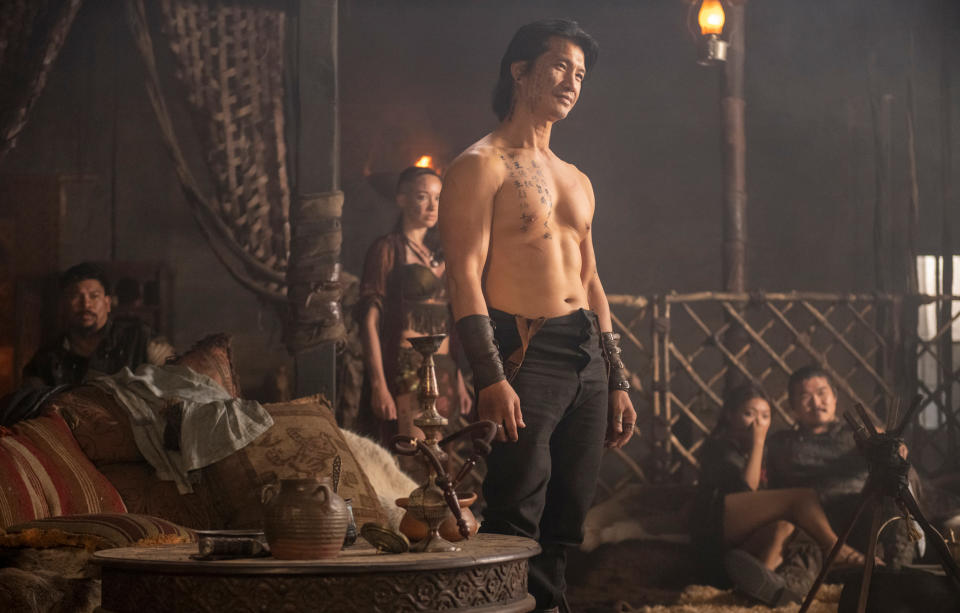How Dustin Nguyen of ‘21 Jump Street’ helped change the way we see Asian American men
- Oops!Something went wrong.Please try again later.
Dustin Nguyen remembers when it first sunk in that “21 Jump Street” had become much more of a phenomenon than he had realized.
The cast made an appearance for a charity event at the Sherman Oaks Galleria in Los Angeles amid the second season of the Fox show in 1987, and Nguyen expected maybe a few hundred people to turn out.
Instead, they were greeted by thousands of delirious fans who had quickly become obsessed with the hit show about youthful detectives going undercover to solve crimes in high schools and colleges.
“We stepped out, and there must’ve been at least 10,000 screaming teenagers,” Nguyen told TODAY. “We were really overwhelmed. I remember thinking this must be like what a rockstar feels like, multiplied by a thousand.”
Nguyen played the trailblazing role of Harry Truman Ioki, a suave, heartthrob cop in a cast that included a young Johnny Depp. At the time, Nguyen was just elated to have landed a role on a popular show as a young actor.

It wasn’t until about two years into the show that he realized how impactful it was in the Asian American acting community, particularly in the way male characters were portrayed. Harry was the rare role that didn’t emasculate an Asian man, play to stereotypes like the nerd or the martial arts guy, or have him speak with an accent.
“I remember some of my peers, talking to them while I was doing ’21 Jump Street,’ and they expressed a lot of frustration, sharing with me about the really bad dialogue and all the clichés (they were being offered),” he said. “I just had one of those moments like, ‘Oh my God, I’m on this show, and I have none of that.’ I just love the way the character was written. I’m very fortunate where I never was in a position where I felt like I was portraying something that was uncomfortable.”
Nguyen, 59, soon became acutely aware of the dearth of quality roles for Asian and Asian American actors in Hollywood after the show’s four-year run concluded in 1991.
“I got kind of spoiled because after I left the show, then you’re kind of back out there and you’re like, ‘Oh man, I had a really good thing,’” he said.
It reached a point where just over a decade after “21 Jump Street” ended, he was out of Hollywood and working a regular job to support his then-wife.
“I was in a really bad place personally,” he said. “I was very depressed, so it just kind of magnified that it was kind of a dead end for me as an actor in terms of what I aspired to do. And I quit, I literally just quit for a while.”

Twenty years later, Nguyen has not only survived the Hollywood roller coaster, he is as busy as ever. He will be filming the third season of the HBO Max series “Warrior” in July and stars in "Blade of the 47 Ronin," an upcoming sequel to the film “47 Ronin.”
He is also viewed as an inspiration by a host of younger Asian American actors who clung to a glimpse of what was possible when they first saw Nguyen on “21 Jump Street" in the late '80s.
“I don’t sit and think about ‘I’m a pioneer’ and this and that — you’re just focused on getting another job to keep working — but it means a lot to me,” he said.
A trailblazing role
Nguyen was in his mid-20s and just looking for steady work when he landed the role on “21 Jump Street.” He said the role was initially slated for a character of color, not specifically an Asian actor, and he remembers being at the audition with African American and Latino actors also vying for the part.
“It was actually very progressive back then,” he said. “I was just kind of ignorant in terms of the significance until the show became a hit and people would start saying, ‘You’re one of the few, if not the only, Asian American leads on a mainstream TV series,' and that hit me kind of hard.”
Peter Feng, a professor of English and women and gender studies at the University of Delaware who is writing a book about Asian Americans on television, noted that "21 Jump Street" airing on Fox, which was a fledgling network at the time, presented a rare opportunity for actors of color. The original cast also included Holly Robinson Peete and Steven Williams, who are Black.
"Fox knew that it was not going to get audiences to leave the big three networks at the time and start watching them, so they went after the people the big three were ignoring," Feng told TODAY. "They went after African American audiences, for example."
Nguyen was born in Saigon and came to the United States from Vietnam after his family fled in 1975 when South Vietnam fell to communist forces. He went to high school in California and landed a few guest roles on soap operas before his big break on “21 Jump Street” as the rare Asian American heartthrob on a mainstream show.
Nguyen's background also was a breakthrough for a high-profile television character.
"For the Asian American community, we all know the most significant thing about that story was that it started off as a character who was supposedly Japanese and they actually wrote in the show that his character was Vietnamese," Feng said.
"That was at a time when the war in Vietnam was still painful for a lot of Americans. To assert that this character was Vietnamese American, I think that was really important. That was absolutely an iconic role."
Nguyen's character on the show was also a detective who happened to be Asian American more than an Asian American who happened to be a detective. He realized by the second season that, fairly or not, his success or failure could affect other Asian American actors vying for mainstream Hollywood projects.
“I was very aware that a lot of these Asian American organizations were promoting the positive image (of the character),” he said. “I really felt that pressure, and part of me as an artist was trying to not let that pressure affect how I was doing my work. I realized the only thing that I could do is try to do the best work I can and represent it positively in that way.”
His work not only had an impact on future Asian American actors but Asian actors around the world. "Mortal Kombat" star Joe Taslim, 40, an action dynamo who is also part of the cast with Nguyen on “Warrior," remembers watching “21 Jump Street” while growing up in Indonesia.
“When I was a kid, I watched Asian characters portrayed as stereotypical and almost like a joke,” Taslim told TODAY. “So when I see Dustin, I was like, ‘OK, this one is cool. And who is this guy? Oh, he’s of Vietnamese descent. He’s our neighbor in Southeast Asia. He’s one of us.'
“He’s a heartthrob on the show, kickass, beautiful hair, great lines and just a great character. Back then, it was a very important moment for me that somehow triggered something inside of me that it’s not impossible anymore (to make it in Hollywood). It was hard, but not impossible.”

However, even in the middle of the whirlwind of the show’s popularity, Nguyen knew it would be difficult to sustain that level of success given the average parts being offered to Asian American actors at the time.
“I enjoyed every minute of it, but maybe because of the way I was raised, my background, I sort of had this innate understanding that it wasn’t going to last forever,” he said. “I was expecting not to work for a little bit after ‘Jump Street.’ I saved up a lot of money, and I lived very modest. I was prepared to be unemployed for a little while, but it turned out to be two years, which seemed like an eternity.”
A winding road
Nguyen landed his next significant role on the show “VIP” from 1998 to 2002, which he called “cheese, but good cheese.” He played a stuntman on the campy show starring Pamela Anderson, which was a lifeline at a time.
“You find yourself on another series that goes three, four seasons, and it’s kind of like winning the lottery,” he said.
The end of “VIP” coincided with a dark period in which Nguyen almost called it a career as he faced personal and professional struggles. His wife at the time, Angela Rockwood, was involved in a crash on a California freeway in 2001 that killed fellow actor Thuy Trang from “Mighty Morphin Power Rangers” and left Rockwood a quadriplegic.
Nguyen was trying to support her while at the same time staying afloat professionally.
“I hit the bottom professionally, and personally I was pretty devastated with what was going on in my personal life,” he said.
It reached a point where Nguyen stopped acting and got a job at a warehouse.
Nguyen’s friend director Ron Yuan threw him a lifeline when he reached out to Nguyen about auditioning for a part in the 2005 Cate Blanchett movie, “Little Fish." Yuan had to give Nguyen’s information directly to the casting director because Nguyen didn’t even have an agent anymore.

Nguyen was working his regular job and wondering if he wanted to act again, but Rockwood told him he should give it a shot. He landed the part, and the next thing he knew he was back in the game.
“That was the movie that really ignited my love for acting again,” he said.
The downside was that the movie was barely seen in the theaters, which worried Nguyen. It led him to make another abrupt life decision to return to his native Vietnam to do a movie called “The Rebel.” He ended up moving to the country of his birth permanently, starting his own production company, and getting into directing.
“Hollywood certainly wasn’t going to give me an opportunity to direct, so Vietnam is where I was able to sort of sharpen my skills and learn,” he said.
"The fact that Dustin has made it work in Vietnam and Hollywood, I think it's a career path we really haven't seen," Feng said.
Nguyen has since returned to Hollywood after initially thinking his life was settled in Vietnam, where he married Vietnamese actor Bebe Pham in 2012 and started a family.
His latest television role goes against many of his previous roles, as he plays a straight-up villain named Zing on “Warrior.” It’s the type of martial arts-heavy role he might have thought twice about accepting in his younger days while worrying about stereotypes, but director Justin Lin and the Asian representation on the show drew him back to Hollywood. The show is a far cry from the sets Nguyen worked on early in his career.

“If you did a guest star appearance back in those days, every successful TV show always had what we termed ‘the Chinatown episode,’” Nguyen said. “Somehow, they’ve got to solve some crime in Chinatown, and in Chinatown, you’ve got to have some Asian people, so the lead guest star would be Asian and then maybe you got like another smaller guest star. But usually back then, you’re one of the only Asians there.”
He noted that the success of movies like “Crazy Rich Asians” and “The Farewell” helped change the climate in Hollywood to one in which a majority-Asian cast and director is seen as viable by the studios and streaming services holding the purse strings.
Speaking out against anti-Asian hate
While Nguyen’s career shows the strides Asian and Asian American actors and directors have made since his days on “21 Jump Street,” the anti-Asian violence and hate that has swept across the U.S. during the pandemic over the last two years has starkly contrasted that progress.
“Particularly last year when all the anti-Asian hate crimes started happening, it was surreal to me,” Nguyen said.
Nguyen said the anti-Asian violence was “a big factor” that led him and his wife to decide on relocating to Hawaii when recently moving his family back to the U.S. He wanted to know his wife and daughters would be in a safe environment if he was away shooting a film or show.
He also noted how the anti-Asian violence mirrors some of the plotline of “Warrior,” which is set in the 1870s in San Francisco and depicts the frequent racism and racist laws faced by Chinese immigrants.
“The show is set in the late 1800s, and I’m sitting here thinking, ‘Have we made any advancement?” he said. “You can’t help but think that. It’s quite tragic.”
Inspiring the next generation
While Nguyen's acting career speaks for itself, his directing work may even be more important than his work in front of the camera.
After all, it makes sense that more Asian representation in positions of power in Hollywood means more influence the community has on roles and portrayals. Nguyen will be directing some episodes of the next season of “Warrior,” a martial arts series based on a story originally conceived by the legendary Bruce Lee.
“Asian directors have more say in the executive meetings about where the story is going to go or to balance all the characters in the show or in a movie,” Taslim said. “I think it’s changing a lot compared to 10 or 20 years ago.”
"These days you have people behind the camera or in the writers' room that are Asian American and they understand what those opportunities and those positions represent," Nguyen said.
Nguyen is also now working with a generation of actors who know what he has meant to the Asian and Asian American acting community since his breakthrough on "21 Jump Street" all those years ago.
Taslim recalled that he couldn't help but adhere to his Indonesian upbringing and repeatedly bow to Nguyen out of respect when they first met. He soon felt the warmth of a Hollywood veteran who has seen it all.
"It was surreal realizing that the person you watched when you were a kid and then inspired you is super humble. He was like, 'Friendship is friendship, no matter that I'm like 20 years older or whatever, but you're my friend, and let's just act like a friend," Taslim said before laughing.
"You don't have to bow every second."

